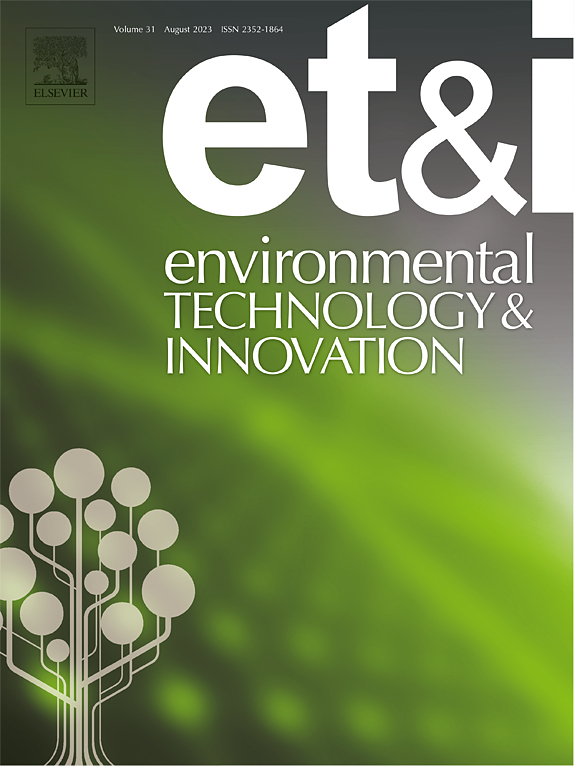Co-application of organic amendment and plastic-degrading microbial inoculum drives functional microbial shifts in plastic-contaminated soils
IF 7.1
2区 环境科学与生态学
Q1 BIOTECHNOLOGY & APPLIED MICROBIOLOGY
引用次数: 0
Abstract
Plastic contamination in soil poses a significant threat to ecosystem health, disrupting soil properties and compromising agricultural sustainability. This study explores a novel bioremediation strategy for plastic-contaminated soil, utilizing a carrier to inoculate a specialized plastic-degrading microbial consortium. Mesocosm experiments were conducted in 4 L containers with 2.8 kg soils amended with three types of plastics—low-density polyethylene (LDPE), linear low-density polyethylene (LLDPE), and naturally weathered mulching film, at a concentration of 0.036 % (w/w)—under both inoculated and non-inoculated conditions. The microbial consortium, comprised of Bacillus subtilis RBM2 and Pseudomonas putida REBP7, was delivered via an organic-mineral blend of vermicompost, biochar (pH 8.50), and urea, aiming to promote its stable incorporation and persistence in the soil (15 % moisture). Viable cell counts using selective culture media and qPCR-based quantification confirmed that inoculated strains not only persisted but also, in some cases, thrived in the presence of plastic contaminants. Metabarcoding analysis of the soil microbiome revealed shifts in community composition and diversity, with specific enrichment of genera associated with plastic degradation. Furthermore, the upregulation of key enzymatic activities related to alkane degradation—such as alkane 1-monooxygenase—highlighted the functional activation of xenobiotic degradation pathways in response to both the inoculum and plastic exposure. Overall, the results demonstrate that the integration of a plastic-degrading microbial consortium via organic amendment can mitigate the adverse impacts of plastic pollution by restoring soil microbial functions and enhancing biodegradation potential. This sustainable approach offers a promising tool for managing plastic contamination in agricultural soils while supporting circular economy principles and long-term soil health.
有机改良剂和塑料降解微生物接种剂的共同应用驱动了塑料污染土壤中功能微生物的转变
土壤中的塑料污染对生态系统健康构成重大威胁,破坏土壤性质,损害农业可持续性。本研究探索了一种新的塑料污染土壤的生物修复策略,利用载体接种专门的塑料降解微生物联盟。在4个 L容器中进行了介观试验,土壤在接种和未接种条件下,以2.8 kg的土壤为基质,分别添加了低密度聚乙烯(LDPE)、线性低密度聚乙烯(LLDPE)和自然风化地膜3种塑料,浓度为0.036 % (w/w)。由枯草芽孢杆菌(Bacillus subtilis) RBM2和恶臭假单胞菌(Pseudomonas putida) REBP7组成的微生物联合体通过蚯蚓堆肥、生物炭(pH 8.50)和尿素的有机-矿物混合物输送,旨在促进其在土壤(15 %水分)中的稳定结合和持久性。使用选择性培养基和基于qpcr的定量的活细胞计数证实,接种的菌株不仅持续存在,而且在某些情况下,在存在塑料污染物的情况下茁壮成长。土壤微生物组的元条形码分析揭示了群落组成和多样性的变化,与塑料降解相关的属的特定富集。此外,与烷烃降解相关的关键酶活性(如烷烃1-单加氧酶)的上调强调了外生生物降解途径在接种和塑料暴露下的功能激活。总体而言,研究结果表明,通过有机改良剂整合塑料降解微生物联盟可以通过恢复土壤微生物功能和提高生物降解潜力来减轻塑料污染的不利影响。这种可持续的方法为管理农业土壤中的塑料污染提供了一个有希望的工具,同时支持循环经济原则和长期土壤健康。
本文章由计算机程序翻译,如有差异,请以英文原文为准。
求助全文
约1分钟内获得全文
求助全文
来源期刊

Environmental Technology & Innovation
Environmental Science-General Environmental Science
CiteScore
14.00
自引率
4.20%
发文量
435
审稿时长
74 days
期刊介绍:
Environmental Technology & Innovation adopts a challenge-oriented approach to solutions by integrating natural sciences to promote a sustainable future. The journal aims to foster the creation and development of innovative products, technologies, and ideas that enhance the environment, with impacts across soil, air, water, and food in rural and urban areas.
As a platform for disseminating scientific evidence for environmental protection and sustainable development, the journal emphasizes fundamental science, methodologies, tools, techniques, and policy considerations. It emphasizes the importance of science and technology in environmental benefits, including smarter, cleaner technologies for environmental protection, more efficient resource processing methods, and the evidence supporting their effectiveness.
 求助内容:
求助内容: 应助结果提醒方式:
应助结果提醒方式:


